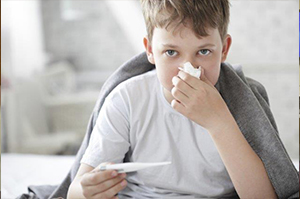We all know the dry, scratchy feeling of a sore throat at the onset of a cold. Other symptoms that follow may include a runny nose, congestion and cough. While unpleasant, these symptoms generally go away in a few days without treatment.
A more serious cause of a sore throat is Strep throat, which is an infection caused by the bacteria group A Streptococcus. With Strep, the throat pain is much more severe and persists.
Strep throat is a very common illness in children under 15, but less common in adults. It is highly contagious and easily spread to younger children. The good news is that only a small portion of sore throats are the result of Strep throat.
Strep is an infection of the throat and tonsils caused by the bacteria group A Streptococcus. The infection can show up anytime of the year, but is most prevalent in the fall and winter. The bacteria are spread through coughing or sneezing and can also be transferred by toys or other objects the infected person has touched.
Symptoms of Strep include a severe sore throat, fever of 101 or above, red and swollen tonsils, stomach ache, headache and swollen lymph nodes in the neck. Strep infection is unlikely if there is no sore throat or fever, or if the patient has significant respiratory symptoms like coughing or congestion.
A healthcare professional can check for Strep by swabbing the throat to see if the bacteria are present. If the test is positive, Strep is usually easily treated with antibiotics.
Although a healthy person can fight the infection without medication, antibiotics can decrease the sickness time, reduce the symptoms, help prevent the spreading of the infection and prevent much more serious complications, such as rheumatic fever, tonsil infection or kidney disease.
A person with Strep throat should stay home from work, school or daycare until they are fever free for 24 hours so they do not spread the infection. Be sure to take the full 10-day dose to prevent the symptoms from returning.
The best way to keep from getting strep throat is by covering your mouth when coughing and sneezing, wash your hands often and do not sharing utensils or drinks. The infection can also be transferred by a toothbrush touching another toothbrush. Once your child gets better, we recommend you throw out their toothbrush and get a new one.
Contact your doctor if the symptoms do not improve within 48 hours of taking an antibiotic. The provider may need to prescribe a different type of antibiotic to fight the infection.
Dr. Ron Spiegel specializes in Pediatrics and is Board Certified by the American Board of Pediatrics. He has worked in the Valley since 2004. He welcomes new patients at Snoqualmie Ridge Medical Clinic, located at 35020 SE Kinsey Street on Snoqualmie Ridge.
For more information about Dr. Spiegel, click here. Call Snoqualmie Ridge Medical Clinic at 425-396-7682 to make an appointment.

